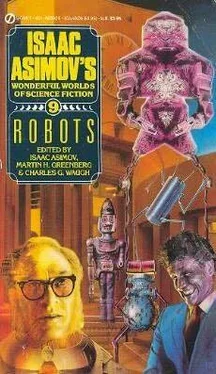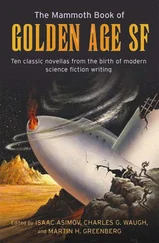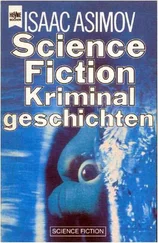Frederik Pohl - Isaac Asimov's Worlds of Science Fiction. Book 9 - Robots
Здесь есть возможность читать онлайн «Frederik Pohl - Isaac Asimov's Worlds of Science Fiction. Book 9 - Robots» весь текст электронной книги совершенно бесплатно (целиком полную версию без сокращений). В некоторых случаях можно слушать аудио, скачать через торрент в формате fb2 и присутствует краткое содержание. Год выпуска: 1989, ISBN: 1989, Издательство: Robinson Publishing, Жанр: Фантастика и фэнтези, на английском языке. Описание произведения, (предисловие) а так же отзывы посетителей доступны на портале библиотеки ЛибКат.
- Название:Isaac Asimov's Worlds of Science Fiction. Book 9: Robots
- Автор:
- Издательство:Robinson Publishing
- Жанр:
- Год:1989
- ISBN:ISBN: 1-85487-041-6
- Рейтинг книги:4 / 5. Голосов: 1
-
Избранное:Добавить в избранное
- Отзывы:
-
Ваша оценка:
- 80
- 1
- 2
- 3
- 4
- 5
Isaac Asimov's Worlds of Science Fiction. Book 9: Robots: краткое содержание, описание и аннотация
Предлагаем к чтению аннотацию, описание, краткое содержание или предисловие (зависит от того, что написал сам автор книги «Isaac Asimov's Worlds of Science Fiction. Book 9: Robots»). Если вы не нашли необходимую информацию о книге — напишите в комментариях, мы постараемся отыскать её.
Isaac Asimov's Worlds of Science Fiction. Book 9: Robots — читать онлайн бесплатно полную книгу (весь текст) целиком
Ниже представлен текст книги, разбитый по страницам. Система сохранения места последней прочитанной страницы, позволяет с удобством читать онлайн бесплатно книгу «Isaac Asimov's Worlds of Science Fiction. Book 9: Robots», без необходимости каждый раз заново искать на чём Вы остановились. Поставьте закладку, и сможете в любой момент перейти на страницу, на которой закончили чтение.
Интервал:
Закладка:
He had within himself somehow the means to raise his own body temperature, and was exploiting the one limitation of the plastic in which he was locked. For glasstex, Cliff now remembered, was a thermoplastic material, one that set by cooling and conversely would soften again with heat. Gnut was melting his way out!
In three-word snatches, Cliff described this. The robot became cherry red, the sharp edges of the icelike block rounded, and the whole structure began to sag. The process accelerated. The robot's body moved more widely. The plastic lowered to the crown of his head, then to his neck, then to his waist, which was as far as Cliff could see. His body was free! And then, still cherry-red, he moved forward out of sight!
Cliff strained eyes and ears, but caught nothing but the distant roar of the watchers beyond the police lines and a few low, sharp commands from the batteries posted around him. They, too, had heard, and perhaps seen by telescreen, and were waiting.
Several minutes passed. There was a sharp, ringing crack; the great metal doors of the wing flew open, and out stepped the metal giant, glowing no longer. He stood stock-still, and his red eyes pierced from side to side through the darkness.
Voices out in the dark barked orders and in a twinkling Gnut was bathed in narrow, crisscrossing rays of sizzling, colored light. Behind him the metal doors began to melt, but his great green body showed no change at all. Then the world seemed to come to an end; there was a deafening roar, everything before Cliff seemed to explode in smoke and chaos, his tree whipped to one side so that he was nearly thrown out. Pieces of debris rained down. The tank gun had spoken, and Gnut, he was sure, had been hit.
Cliff held on tight and peered into the haze. As it cleared he made out a stirring among the debris at the door, and then dimly but unmistakably he saw the great form of Gnut rise to his feet. He got up slowly, turned toward the tank, and suddenly darted toward it in a wide arc. The big gun swung in an attempt to cover him, but the robot sidestepped and then was upon it. As the crew scattered, he destroyed its breech with one blow of his fist, and then he turned and looked right at Cliff.
He moved toward him, and in a moment was under the tree. Cliff climbed higher. Gnut put his two arms around the tree and gave a lifting push, and the tree tore out at the roots and fell crashing to its side. Before Cliff could scramble away, the robot had lifted him in his metal hands.
Cliff thought his time had come, but strange things were yet in store for him that night. Gnut did not hurt him. He looked at him from arm's length for a moment, then lifted him to a sitting position on his shoulders, legs straddling his neck. Then, holding one ankle, he turned and without hesitation started down the path which led westward away from the building.
Cliff rode helpless. Out over the lawns he saw the muzzles of the scattered field pieces move as he moved, Gnut-and himself-their one focus. But they did not fire. Gnut, by placing him on his shoulders, had secured himself against that-Cliff hoped.
The robot bore straight toward the Tidal Basin. Most of the field pieces throbbed slowly after. Far back, Cliff saw a dark tide of confusion roll into the cleared area-the police lines had broken. Ahead, the ring thinned rapidly off to the sides; then, from all directions but the front, the tide rolled in until individual shouts and cries could be made out. It came to a stop about fifty yards off, and few people ventured nearer.
Gnut paid them no attention, and he no more noticed his burden than he might a fly. His neck and shoulders made Cliff a seat hard as steel, but with the difference that their underlying muscles with each movement flexed, just as would those of a human being. To Cliff, this metal musculature became a vivid wonder.
Straight as the flight of a bee, over paths, across lawns and through thin rows of trees Gnut bore the young man, the roar of thousands of people following close. Above droned copters and darting planes, among them police cars with their nerve-shattering sirens. Just ahead lay the still waters of the Tidal Basin, and in its midst the simple marble tomb of the slain ambassador, Klaatu, gleaming black and cold in the light of the dozen searchlights always trained on it at night. Was this a rendezvous with the dead?
Without an instant's hesitation, Gnut strode down the bank and entered the water. It rose to his knees, then above his waist, until Cliff's feet were under. Straight through the dark waters for the tomb of Klaatu the robot made his inevitable way.
The dark square mass of gleaming marble rose higher as they neared it. Gnut's body began emerging from the water as the bottom shelved upward, until his dripping feet took the first of the rising pyramid of steps. In a moment they were at the top, on the narrow platform in the middle of which rested the simple oblong tomb.
Stark in the blinding searchlights, the giant robot walked once around it, then, bending, he braced himself and gave a mighty push against the top. The marble cracked; the thick cover slipped askew and broke with a loud noise on the far side. Gnut went to his knees and looked within, bringing Cliff well up over the edge.
Inside, in sharp shadow against the converging light beams, lay a transparent plastic coffin, thick-walled and sealed against the centuries, and containing all that was mortal of Klaatu, unspoken visitor from the great Unknown. He lay as if asleep, on his face the look of godlike nobility that had caused some of the ignorant to believe him divine. He wore the robe he had arrived in. There were no faded flowers, no jewelry, no ornaments; they would have seemed profane. At the foot of the coffin lay the small sealed box, also of transparent plastic, which contained all of Earth's records of his visit-a description of the events attending his arrival, pictures of Gnut and the traveler, and the little roll of sight-and-sound film which had caught for all time his few brief motions and words.
Cliff sat very still, wishing he could see the face of the robot. Gnut, too, did not move from his position of reverent contemplation-not for a long time. There on the brilliantly lighted pyramid, under the eyes of a fearful, tumultuous multitude, Gnut paid final respect to his beautiful and adored master.
Suddenly, then, it was over. Gnut reached out and took the little box of records, rose to his feet and started down the steps.
Back through the water, straight back to the building, across lawns and paths as before, he made his irresistible way. Before him the chaotic ring of people melted away, behind they followed as close as they dared, trampling each other in their efforts to keep him in sight. There are no television records of his return. Every pickup was damaged on the way to the tomb.
As they drew near the building, Cliff saw that the tank's projectile had made a hole twenty feet wide extending from the roof to the ground. The door still stood open, and Gnut, hardly varying his almost jerkless rhythm, made his way over the debris and went straight for the port end of the ship. Cliff wondered if he would be set free.
He was. The robot set him down and pointed toward the door; then, turning, he made the sounds that opened the ship. The ramp slid down and he entered.
Then Cliff did the mad, courageous thing which made him famous for a generation. Just as the ramp started sliding back in, he skipped over it and himself entered the ship. The port closed.
7
It was pitch dark, and the silence was absolute. Cliff did not move. He felt that Gnut was close, just ahead, and it was so.
His hard metal hand took him by the waist, pulled him against his cold side, and carried him somewhere ahead. Hidden lamps suddenly bathed the surroundings with bluish light.
Читать дальшеИнтервал:
Закладка:
Похожие книги на «Isaac Asimov's Worlds of Science Fiction. Book 9: Robots»
Представляем Вашему вниманию похожие книги на «Isaac Asimov's Worlds of Science Fiction. Book 9: Robots» списком для выбора. Мы отобрали схожую по названию и смыслу литературу в надежде предоставить читателям больше вариантов отыскать новые, интересные, ещё непрочитанные произведения.
Обсуждение, отзывы о книге «Isaac Asimov's Worlds of Science Fiction. Book 9: Robots» и просто собственные мнения читателей. Оставьте ваши комментарии, напишите, что Вы думаете о произведении, его смысле или главных героях. Укажите что конкретно понравилось, а что нет, и почему Вы так считаете.









